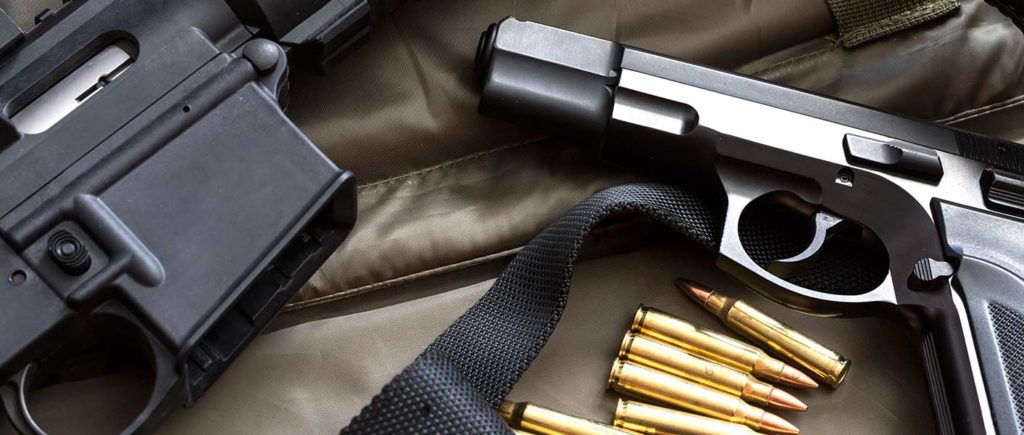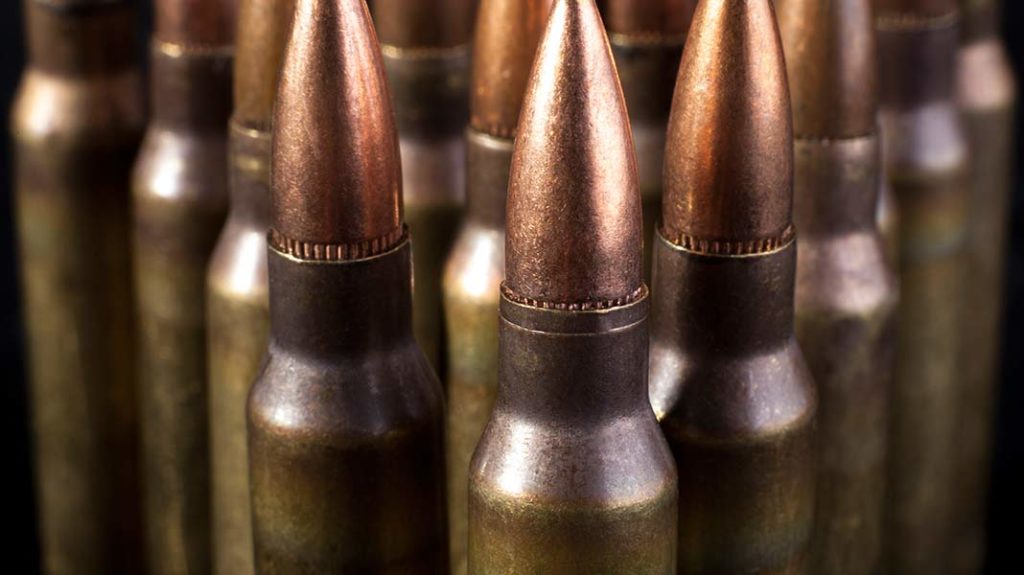Defense Attorneys for Weapons Offenses in Michigan
Prosecutors take weapons cases very seriously and often seek stiff jail terms for defendants. You need a very credible, influential criminal defense attorney by your side.

How exactly does the law define “weapon”?
The defense attorneys for weapons charges at LEWIS & DICKSTEIN, P.L.L.C. know how to challenge weapons charges and are always on the lookout for creative and effective ways to obtain a dismissal of the charges and have the case thrown out of court when possible. In one way or another, every case is defensible. We are not afraid to win! These cases can have severe consequences, and you do not want to face a judge without experienced defense attorneys for weapons charges.
By their very nature, many items can be used as weapons. In fact, almost anything can qualify as a “weapon,” depending on how someone uses it. Michigan law specifically lists certain items considered weapons by definition.
Some examples include:
- Pistol
- Any other firearm
- Air gun
- Dagger
- Dirk
- Razor
- Stiletto
- Folding knife with a blade over 3 inches
- Bomb
- Double-edged non-folding stabbing instrument
- Machine gun
- Blackjack
- Metallic (brass) knuckles
- Slingshot
- Any other dangerous or deadly weapon or instrument (for example, swords, spears, nunchucks, machetes, and Chinese throwing stars)
Carrying a Concealed Weapon Charges
When most people think of carrying concealed weapon (CCW) charges, they think of pistols. But keep in mind there are several items you may not carry concealed (listed above). One exception is hunting knives, which someone may legally carry openly or concealed if the hunting knife is “adapted and carried as such,” meaning you probably don’t want to carry one, for example, into a bar, sports arena, or movie theater.
Many people are also surprised to learn, often while being arrested, that any weapon inside a vehicle is automatically considered concealed, even if it is out in the open and easily viewable.

Penalty for Carrying a Concealed Weapon Charges
A person may not carry a concealed weapon on their person or in a motor vehicle, motorboat, sailboat, aircraft, or any other mechanically propelled vehicle. Having a weapon in your car, boat, etc., is the same as hiding it under your clothing so no one can see it. You may have heard of “open carry.” Open carry means carrying a pistol in a holster or waistband so anyone can see it. Open carry is entirely legal, except you may not have more than 75% of the weapon concealed. The weapon (gun) must be registered in the carrier’s name unless the person possessing the firearm has a Concealed Pistol License (CPL). The penalty for carrying a concealed weapon is a potential maximum of 5 years in prison and/or a $2,500 fine and a possible five (5) years on probation.
Places you may not carry a concealed firearm even with a CPL:
- A bank or credit union
- A church or other place of religious worship
- A court
- A theater
- A sports arena
- A daycare center
- A hospital
- An establishment licensed under the Liquor Control Code
- A college dormitory
- A school
- An entertainment venue with a capacity of 2500 or more people
- A casino
The penalties for carrying a concealed pistol in a prohibited area are:
- 1st Offense, State Civil Infraction, $500 fine, CPL permit suspended for six (6) months;
- 2nd Offense: Up to 90 days in jail, up to 2 years on probation, $1000 fine, and CPL permit revoked;
- 3rd and subsequent offenses: a felony punishable by up to 4 years in prison, up to 5 years on probation, a $5000 fine, and revoked CPL permit.
However, people may “open carry” a pistol into these places, except courthouses and casinos.

Michigan Weapons Charges
Here is what you need to know about the various weapons charges in Michigan.
Brandishing a Firearm
Brandishing means waving or displaying a firearm in a threatening manner. The penalty for brandishing is 90 days in jail and up to 2 years on probation.
Carrying a Weapon with Unlawful Intent
It is a 5-year felony to carry any weapon “with intent to use the same unlawfully against the person of another.” Weapons include any of the items listed above. In addition to the maximum 5-year prison sentence, a judge can order the defendant to serve five (5) years on court-supervised probation. A defense attorney for weapons charges will fight to persuade the prosecutor to dismiss or reduce CCW charges.
Improperly Transporting a Firearm
A person may transport an unloaded, dismantled firearm in a vehicle or one inaccessible to the driver and anyone else. Violation of this law carries a possible 90-day jail term and up to 2 years on probation. This offense is probably most applicable to hunters and target shooters.
Felonious Assault
Felonious assault is where a person uses a dangerous weapon to threaten another to place them in fear of an imminent physical battery but does not intend to inflict great bodily harm or death. No touching is required as long as the victim believes they are about to be harmed. This offense carries a maximum 4-year prison term and up to 5 years under court supervision and control.
Felony Firearm
A Felony Firearm charge is where a person possesses a firearm while committing or attempting to commit a felony. This crime carries a mandatory 2-year consecutive prison term for a first offense, served in addition to the penalty for the underlying felony. A second such offense has a 5-year additional prison term, and a third or subsequent offense carries a 10-year term. Neither probation nor county jail time is possible for a felony firearm conviction; prison is mandatory.
Felon in Possession of a Firearm
A person convicted of a felony may not possess a firearm or ammunition for three (3) years after the probation or parole has expired. The waiting period is five (5) years for “specified felonies,” which involve serious violent crimes, drug crimes, explosives, or unlawful firearms distribution. This offense is punishable by up to five (5) years in prison and five (5) years of probation. A person convicted of a “specified felony” must apply for gun rights restoration in a Michigan Circuit Court. A felony under Michigan law is any offense punishable by greater than one year.
Possession of a Firearm by a Person Convicted of Domestic Violence
A person convicted of felony or misdemeanor domestic violence cannot carry, possess, own, transport, purchase, or sell a firearm for eight (8) years following closure of their case, release from probation or incarceration, and payment of all fines. A person convicted of domestic violence who possesses a gun within eight (8) years of the closure of their case is guilty of a felony punishable by up to five (5) years in prison and five (5) years of probation.

More Michigan Weapons Charges
Of all the states in the United States, Michigan has some of the most strict, often overbroad, firearm laws. Other firearm charges handled by the Defense Team with LEWIS & DICKSTEIN, P.L.L.C., include the following:
Careless, Reckless, or Negligent Use of a Firearm
If the careless, reckless, or negligent use of a firearm causes injury or death of another, the penalty is a 2-year misdemeanor and two (2) years of court-supervised probation. If the firearm’s use causes damage to property valued at less than $50.00, the penalty is a possible 90 days in jail and two (2) years of court-supervised probation. If the damage exceeds $50.00, the penalty is one (1) year in jail and two (2) years of probation.
Notably, a conviction for one of these offenses empowers a judge to suspend the defendant’s hunting privileges for up to three (3) years.
Intentional Discharge of Firearm at a Dwelling or Potentially Occupied Structure (includes what is commonly known as a “drive-by shooting”)
- Shooting at a dwelling or potentially occupied structure, whether occupied or not, carries a possible prison term of 10 years and/or a $10,000 fine and five (5) years of court supervision.
- If shooting at the dwelling or structure causes injury to an occupant, the penalty is 15 years and/or a $15,000 fine and five (5) years of court supervision.
- If the shooting causes serious impairment of an occupant’s bodily function, the penalty is 20 years in prison and/or a $25,000 fine and five (5) years of court supervision.
- If the shooting causes the death of an occupant, the penalty is life in prison.
Possession of a Short-Barreled Shotgun or Rifle
People may not possess, make, modify, sell, or transfer short-barreled rifles or shotguns. Rifles and shotguns must have a barrel length of at least 18 inches and an overall length of 26 inches or more. Violation of this law carries a 5-year jail term and five (5) years of court-supervised probation. In these cases, judges and prosecutors make assumptions about a defendant’s intent, and defense attorneys for weapons charges can ensure that their client is treated fairly and has every possible advantage in court.
Firearms: Discharging While Intentionally Aimed at Another but Without Malice
If a person intentionally aims and discharges a firearm at another without the intent to injure them, it is a 1-year misdemeanor with a 2-year term of supervised probation.
Machineguns and Silencers
The same statute prohibits machine guns and silencers. A machine gun can fire multiple rounds continuously with one trigger pull. A silencer, or more accurately a “muffler,” is a device attached to a firearm that deadens a shot’s noise. The penalty for making or possessing either of these items is a potential five (5) years in prison and five (5) years of probation.
People can obtain a federal license to own machine guns and silencers. These federal licenses cost $200 and are available from the Bureau of Alcohol, Tobacco, and Firearms to anyone qualified to purchase and possess a firearm.

More Examples of Crimes the Weapons Handled by the Defense Attorneys with LEWIS & DICKSTEIN, P.L.L.C.
Here are more examples of gun and ammunition crimes in Michigan:
Armor Piercing Ammunition
Armor-piercing ammunition penetrates bulletproof vests and metallic things such as doors, walls, and cars. The bullets are made of tough metals and alloys. Law enforcement recognizes no possible legitimate reason for the public to possess this kind of ammunition and appreciates that someone can use this ammunition to defeat police body armor. Owning this type of ammunition carries a 4-year prison term. If a gun dealer sells this kind of ammunition to an unqualified person, he will lose his dealer’s license and face four (4) years in prison.
Tasers and Stun Guns
These items are known as “electro-muscular disruption devices” and immobilize people by electrical current. They can kill a person in extreme circumstances, so their possession is regulated. There are two kinds of devices: Tasers shoot two darts into a target attached to a power source in the gun; stun guns must touch the target’s body. Stun guns are now legal, but Tasers require a concealed pistol license.
Before 2012, possessing or selling Tasers or stun guns was illegal. But that year, the Michigan Court of Appeals decided it violated the 2nd Amendment to have a total ban on them. A person using a Taser must use it “reasonably.”
Unlawful Sales of Firearms
Michigan law makes it unlawful for a licensed firearm dealer to do any of the following:
- Sell a firearm to a person under 18 years of age (90-day misdemeanor);
- Sell a firearm to a person under 18 years of age, 2nd Offense (4-year felony)
- Sell a firearm or ammunition to a person under indictment for a felony or a convicted felon (10-year felony and a $5,000.00 fine)
Spring Guns (Booby Traps)
It is unlawful for a person to set a gun to go off by movement or disturbance and then leave the triggered gun. Setting a trap is a 1-year misdemeanor. If a trap gun kills someone, the owner will face a manslaughter charge, a 15-year felony.

Weapons Charges Defense Attorneys with Experience
The reputable, respected, and highly experienced defense attorneys for weapons charges with LEWIS & DICKSTEIN, P.L.L.C. have successfully represented thousands of clients on felony and misdemeanor charges in Oakland, Macomb, Wayne, Washtenaw, and Livingston Counties and throughout Michigan. Our firm has a reputation for being committed to the fearless pursuit of our client’s rights and freedoms. We conduct the highest-grade defense while providing close personal attention and care to each client. If you call us for a free consultation, we would be happy to discuss your situation and find a way to help you.
Call us today at (248) 263-6800 for a free consultation or complete an online Request for Assistance Form. We will contact you promptly and find a way to help you.







